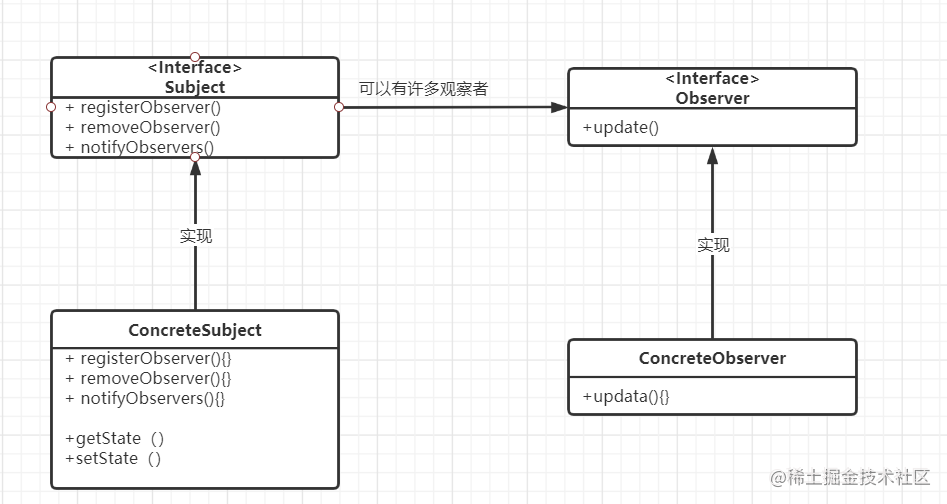observer/observable

目录

1. JDK-Observable 可观察对象类
public class Observable {
private boolean changed = false;
private Vector<Observer> obs;
/** Construct an Observable with zero Observers. */
public Observable() {
obs = new Vector<>();
}
/**
* Adds an observer to the set of observers for this object, provided
* that it is not the same as some observer already in the set.
* The order in which notifications will be delivered to multiple
* observers is not specified. See the class comment.
*
* @param o an observer to be added.
* @throws NullPointerException if the parameter o is null.
*/
public synchronized void addObserver(Observer o) {
if (o == null)
throw new NullPointerException();
if (!obs.contains(o)) {
obs.addElement(o);
}
}
/**
* Deletes an observer from the set of observers of this object.
* Passing <CODE>null</CODE> to this method will have no effect.
* @param o the observer to be deleted.
*/
public synchronized void deleteObserver(Observer o) {
obs.removeElement(o);
}
/**
* If this object has changed, as indicated by the
* <code>hasChanged</code> method, then notify all of its observers
* and then call the <code>clearChanged</code> method to
* indicate that this object has no longer changed.
* <p>
* Each observer has its <code>update</code> method called with two
* arguments: this observable object and <code>null</code>. In other
* words, this method is equivalent to:
* <blockquote><tt>
* notifyObservers(null)</tt></blockquote>
*
* @see java.util.Observable#clearChanged()
* @see java.util.Observable#hasChanged()
* @see java.util.Observer#update(java.util.Observable, java.lang.Object)
*/
public void notifyObservers() {
notifyObservers(null);
}
/**
* If this object has changed, as indicated by the
* <code>hasChanged</code> method, then notify all of its observers
* and then call the <code>clearChanged</code> method to indicate
* that this object has no longer changed.
* <p>
* Each observer has its <code>update</code> method called with two
* arguments: this observable object and the <code>arg</code> argument.
*
* @param arg any object.
* @see java.util.Observable#clearChanged()
* @see java.util.Observable#hasChanged()
* @see java.util.Observer#update(java.util.Observable, java.lang.Object)
*/
public void notifyObservers(Object arg) {
/*
* a temporary array buffer, used as a snapshot of the state of
* current Observers.
*/
Object[] arrLocal;
synchronized (this) {
/* We don't want the Observer doing callbacks into
* arbitrary code while holding its own Monitor.
* The code where we extract each Observable from
* the Vector and store the state of the Observer
* needs synchronization, but notifying observers
* does not (should not). The worst result of any
* potential race-condition here is that:
* 1) a newly-added Observer will miss a
* notification in progress
* 2) a recently unregistered Observer will be
* wrongly notified when it doesn't care
*/
if (!changed)
return;
arrLocal = obs.toArray();
clearChanged();
}
for (int i = arrLocal.length-1; i>=0; i--)
((Observer)arrLocal[i]).update(this, arg);
}
/**
* Clears the observer list so that this object no longer has any observers.
*/
public synchronized void deleteObservers() {
obs.removeAllElements();
}
/**
* Marks this <tt>Observable</tt> object as having been changed; the
* <tt>hasChanged</tt> method will now return <tt>true</tt>.
*/
protected synchronized void setChanged() {
changed = true;
}
/**
* Indicates that this object has no longer changed, or that it has
* already notified all of its observers of its most recent change,
* so that the <tt>hasChanged</tt> method will now return <tt>false</tt>.
* This method is called automatically by the
* <code>notifyObservers</code> methods.
*
* @see java.util.Observable#notifyObservers()
* @see java.util.Observable#notifyObservers(java.lang.Object)
*/
protected synchronized void clearChanged() {
changed = false;
}
/**
* Tests if this object has changed.
*
* @return <code>true</code> if and only if the <code>setChanged</code>
* method has been called more recently than the
* <code>clearChanged</code> method on this object;
* <code>false</code> otherwise.
* @see java.util.Observable#clearChanged()
* @see java.util.Observable#setChanged()
*/
public synchronized boolean hasChanged() {
return changed;
}
/**
* Returns the number of observers of this <tt>Observable</tt> object.
*
* @return the number of observers of this object.
*/
public synchronized int countObservers() {
return obs.size();
}
}
2. JDK-Observer 观察者
public interface Observer {
/**
* This method is called whenever the observed object is changed. An
* application calls an <tt>Observable</tt> object's
* <code>notifyObservers</code> method to have all the object's
* observers notified of the change.
*
* @param o the observable object.
* @param arg an argument passed to the <code>notifyObservers</code>
* method.
*/
void update(Observable o, Object arg);
}
3. demo
import java.util.Observable;
// 继承Observable类
// MyObservable 是一个被观察者
public class MyObservable extends Observable {
public MyObservable() {}
private volatile static MyObservable myObservable;
public static MyObservable getInstance() {
if (myObservable == null) {
synchronized (MyObservable.class) {
if (myObservable == null) {
myObservable = new MyObservable();
}
}
}
return myObservable;
}
// 发消息 给所有的观察者
public void postMessage(String msg) {
// 标记为已更改
setChanged();
// 如果已更改,通知所有的观察者
notifyObservers(msg);
}
}
import androidx.appcompat.app.AppCompatActivity;
import android.os.Bundle;
import android.util.Log;
import android.view.View;
import java.util.Observable;
import java.util.Observer;
public class MainActivity extends AppCompatActivity implements Observer {
@Override
protected void onCreate(Bundle savedInstanceState) {
super.onCreate(savedInstanceState);
setContentView(R.layout.activity_main);
// 把自己设置为观察者
if (this instanceof Observer) {
MyObservable.getInstance().addObserver(this);
}
// 点击button,触发 被观察者 发消息给 观察者
findViewById(R.id.post_msg_bt).setOnClickListener(new View.OnClickListener() {
@Override
public void onClick(View view) {
// 调用 被观察者 的 postMessage 方法,通知所有的观察者
MyObservable.getInstance().postMessage("ok");
}
});
}
// 接收回调
@Override
public void update(Observable observable, Object obj) {
Log.d("AAAAAAAAA", "msg: " + obj);
}
}